If You Loved Dune, Check Out These 7 SFF Books by Middle Eastern and North African Authors
Time travel, space travel, assassins, and more!
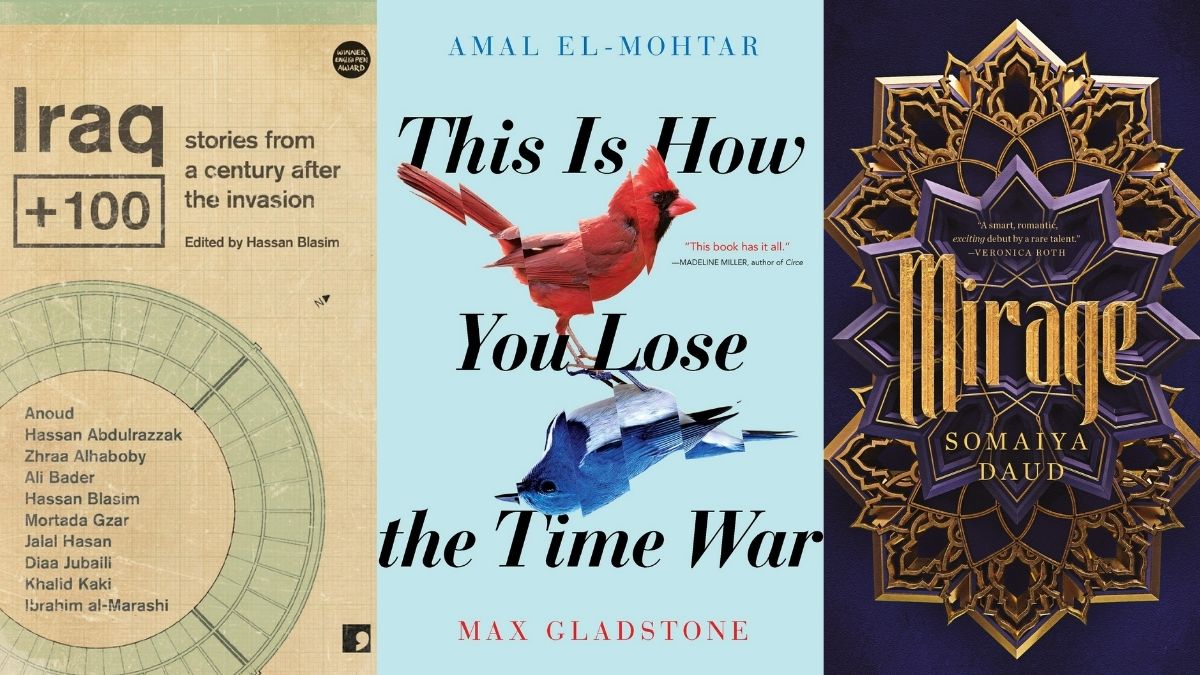

One of the under-discussed aspects of Dune’s legacy is the inspiration and sometimes appropriative ways author Frank Herbert used “The East,” Islam, and more. If you make it past the first book in the series the new movie is based on, Herbert critiques the imperialist fantasies and white-savior complex. However, with the director (Villeneuve) wanting three whole movies for book one, we may never get there this decade.
Regardless of Herbert’s treatment (both paternalistic and exotified) of an Arab “other,” it is worth noting that decades after his work was first published, not much has changed. We are still making adaptions (and knock-offs) of this one book, and most people can’t name an Arab writer or writer of Arab descent. Even decades after Edward Said’s seminal text, Orientalism (which critiqued the “Western” view of “The East” as just existing in opposition), things are moving at a snail’s pace.
It doesn’t fare well for other mediums like filmmaking, visual art, etc., either, and the lack of MENA (the Middle East and North African) performers in the latest adaption of Dune doesn’t help. When people talk about what encompasses MENA, this usually includes North African coastal countries and everything between Syria and Oman. The easternmost part of the MENA region is Iran. Even then, sometimes the list consists of Turkey, Somalia, Turkey, and more. Even before the discovery of oil (“spice” in Dune’s allegorical sense), these places were under constant siege of imperialism and colonialism. This is why many of these countries have cultural ties like food, religion, language, and more.
Arabian Nights and Days by Naguib Mahfouz
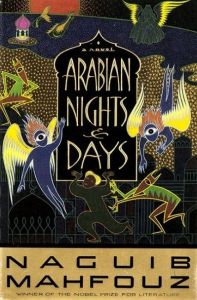
(Image: Anchor Books.)
When Europe was experiencing its Dark Ages, the greater Arab world was experiencing a cultural and scientific boom (a.k.a. Islamic Golden Age). Regional stories (from Greece to India) were compiled together and translated into Arabic in One Thousand and One Nights (a.k.a. Arabian Nights). The first major European translation (by a French man) added stories with familiar characters like Aladdin, Ali Baba, etc., first heard in Syrian.
This is important context, as this book by Mahfouz reimagines many of the stories in the “original” work. The closest comparison is adapting Homer’s epics or the Brother’s Grimm, but even those were on a much smaller scale. The Egyptian writer won the 1988 Novel Prize for Literature a few years earlier.
We Hunt the Flame by Hafsah Faizal
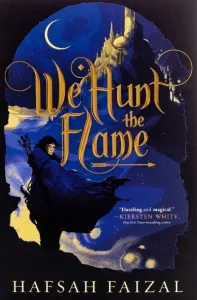
(Image: Square Fish)
This book follows two main legendary protagonists who cross paths under dire circumstances. Zafira is a hunter who disguises herself as a man to feed her people, and Nasir is forced to be a cold-hearted assassin to appease his autocratic sultan’s father. Both go to retrieve an artifact, but Nasir is also ordered to kill the infamous hunter. The artifact’s power will change both their lives forever.
Voted best YA novel at the inaugural FIYAH Con’s Ignyte Award, this book made a lot of “best YA” lists in 2019. This book is the first book in a duology and with We Free the Stars next.
Iraq + 100: Stories From a Century After the Invasion edited by Hassam Blasim
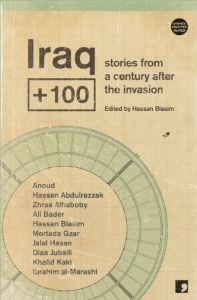
(Image: Tor Books.)
One of NPR’s best books of 2017, this book is a collection of short stories imagining Iraq 100 years after the 2003 invasion by American and British troops. Some look to the future as something salvageable and hopeful, while others see an authoritarian shift rising.
If this sounds interesting, there is another book that looks to be science fiction called Palestine + 100. This anthology edited by Basma Ghalayini looks at 100 years after “The Nakba” or “The Catastrophe.” This moment in 1948 was when about half of the Palestinian Arabs (est. 700,000+) were forced out of their homes the year Israel was founded.
This Is How You Lose the Time War by Amal El-Mohtar and Max Gladstone
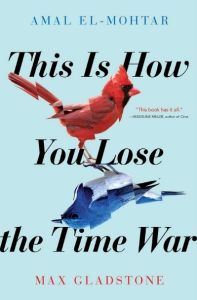
(Image: Callery/Saga Press)
The epistolary novel follows two agents traveling across time on missions and sending notes to each other in different places and historical moments. Each of the letters from the blue and red agents was written by El-Mohtar and Gladstone, respectively.
Like Faizal’s book, this novella won a 2020 Ignyte Award. El-Mohtar and Gladstone also earned a Hugo, Locus, and Nebula Award for this speculative literary fiction. In addition to El-Mohtar winning awards, the Lebanese Canadian author has also reviewed SFF books for the New York Times and been a host on Brandon Sanderson’s podcast Writing Excuses.
Frankenstein in Baghdad by Ahmed Saadawi and translated by Jonathan Wright

(Image: Penguin Books.)
Okay, so by the title, it looks like a straight-up horror, but I think there are science fiction elements that make it worthy of this list. (Also, come on. Halloween is like three days away!)
An adaptation of Mary Shelley’s Prometheus (a.k.a. Frankenstein), this book follows an oddball scavenger collecting body parts in the U.S.-occupied Bagdad. He hopes that if he can piece them together enough, that will warrant them whole enough to get a proper burial. The problem is, a corpse goes missing. Then, rumors begin of a hideous criminal impervious to bullets roaming the streets at night.
The Book of Disappearance by Ibtisam Azem and translated by Sinan Antoon
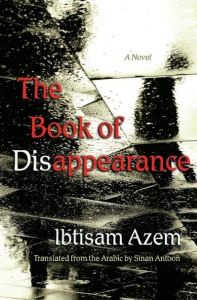
(Image: Syracuse University Press.)
This magical realism novel set in Tel Aviv follows the lives of the Israeli neighbors shocked when all the Palestinians disappear one day. Told through the perspective of two narrators with different experiences, the book investigates loss and memory. The novel also highlights that while Palestinians are second-class citizens and dehumanized in Israel, if they really did disappear overnight as many wish, it wouldn’t be sunshine and rainbows for the settlers. Interpersonal relationships and interconnected lives would feel the loss and a desire for answers.
Mirage by Somaiya Daud
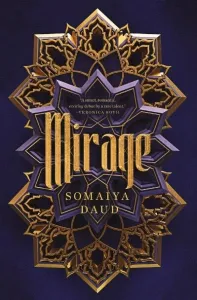
(Image: Flatiron Books)
This YA space fantasy adventure follows a young woman, Amani, who finds solace in the poetry of the old world as an escape from the brutality of the occupied Vathek empire. She finds herself kidnapped and secretly held in the royal palace. Why? She looks almost identical to the half-Vathek princess Maram and serves as her body double in situations dangerous. Simultaneously amazed by the palace’s beauty and stressed (to put it lightly) over playing Maram believably in public, (but more likable than the princess of the brutal empire that everyone hates) Amani just wants to survive.
Morocco’s poetry is laced throughout the novel. Daud spoke about how she and her mother (who grew up in Morocco) worked on translating these common grade schools poems. The second book, A Court of Lions released in August 2020.
(Image: Tor Books, Gallery/Saga Press, and Flatiron Books.)
The Mary Sue may earn an affiliate commission on products and services purchased through links.
The Mary Sue may have advertising partnerships with some of the publishers and titles on this list.
Want more stories like this? Become a subscriber and support the site!
—The Mary Sue has a strict comment policy that forbids, but is not limited to, personal insults toward anyone, hate speech, and trolling.—
Have a tip we should know? [email protected]
